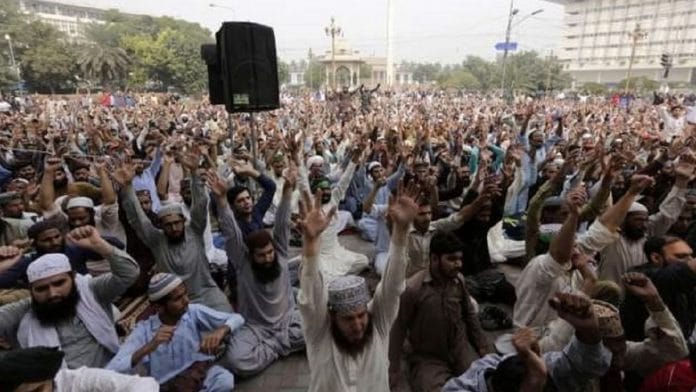New Delhi: Pakistan banned its far-Right Islamic party Tehreek e Labbaik on Thursday under the Anti Terrorsim Act, days after the party clashed with the Punjab Police over a solidarity march for Palestine. While most Pakistanis celebrated the move, saying that the ‘country is healing rapidly’, there were a few skeptics. They called it a ‘staged drama’.
“It is practically impossible to permanently eliminate religious terrorist organizations like TLP or TTP without also ending the Pakistan Army’s illegitimate rule and occupation. Such a move would lead to the complete collapse of the Pakistan Army. Therefore, it is not possible. All this is certainly a staged drama to achieve short-term objectives,” Pakistani independent journalist Ahmad Noorani, who is currently in exile, wrote on X.
Pakistani lawyer and activist Yasser Latif Hamdani noted that TLP was supported by the establishment when it was advantageous for them.
“TLP is a religious group that arose in the aftermath of Mumtaz Qadri’s assassination. The establishment found the group useful in cutting down Pakistan Muslim League Nawaz in 2017 and onward because PMLN had the same Barelvi vote bank,” he told ThePrint.
On Friday, Pakistan interior ministry notified the ban declaring the religio-political party a proscribed organisation under the anti-terrorism act (ATA). “Proscribing an “organisation” under Anti-Terrorism Act is different from banning/dissolving a “political party” under the Elections Act/Constitution. TLP is an enlisted political party with ECP. Merely proscribing it under ATA is problematic, both legally and strategically,” Pakistani lawyer and ICJ jurist Reema Omer wrote on X.
Political economist Niaz Murtaza agreed. He called it ‘a ban without a ban.’
“This is called banning without banning-to fool people. Announce loudly that we have banned it but ban it under the wrong Act so that it actually remains unbanned. Typical stuff. Until and unless TLP is banned under the Elections Act via SC case, it remains unbanned,” he wrote on X.
Also read: America imagines Asim Munir is the cure to jihadism. He is the disease
‘Genies that refuse to go back’
On 17 October, the Maryam Nawaz-led Punjab government moved to seek federal authorisation to outlaw the party.
Many Pakistanis appreciated her move. Generally criticised for her acts, she is now being labelled the ‘Lioness of Punjab’.
But not everyone shares the same sentiments. Sharing an incident from a day ago, where a man slit his aunt’s throat over blasphemy charges, filmmaker and rights activist Ali Raza wrote on X, “You may ban TLP but what they preached has not only reached to our working class, but intelligence officers, police and politicians. You can’t undo that.”
Former commandant of Pakistan’s Frontier Constabulary called out Pakistan’s history of ‘creating such forces for short-term advantages’. He said the TLP and its like are ‘genies that refuse to go back in their bottle’.
“History is full of examples where these creations, once unleashed, turned into monsters that could not be contained. The same demons we summon for short-term advantage eventually grow into genies that refuse to go back into their bottles,” he wrote on X.
Also read: TLP chief tells Pakistanis to take up arms against India. People call him rioter & a sell-out
Rise, rhetoric & a reset
The TLP, deemed notorious for its hardline rhetoric, sweeping blasphemy allegations, street agitation and violence, was previously banned in 2021. The prohibition was lifted six months later, following negotiations with the government.
“Imran Khan also tried to ban them in 2021 but the establishment of the time advised against it arguing that they could still be useful against PMLN,” said Hamdani.
He is optimistic this time around though. “Now that the establishment and PMLN are on the same page, it seems that the door has been closed on TLP. Is it sustainable? I think so because there seems to be a genuine concern in the establishment about the levels of Barelvi radicalisation,” he said.
The latest decision, taken Thursday at a federal cabinet meeting chaired by Prime Minister Shehbaz Sharif, came on the recommendation of the Punjab provincial government under the country’s Anti-Terrorism Act (ATA), according to local reports.
The Prime Minister’s Office said the cabinet “unanimously approved” the move after reviewing evidence of TLP’s involvement in what it described as “violent and terrorist activities”.
“The organisation, established in 2016, has repeatedly incited violence across the country,” the statement read. “Despite earlier assurances, it has continued to carry out acts of terrorism and violent unrest.”
Under Pakistan’s Constitution, the final decision to dissolve a political party rests with the Supreme Court. The government is expected to refer its declaration to the court within 15 days, Dawn reported.
Thursday’s decision marks the second time Islamabad has formally moved to outlaw the group. Earlier that day, Pakistan’s cybercrime authorities detained more than 100 social media activists affiliated with the group for posting inflammatory content online, Punjab Information Minister Azma Bokhari said at a press conference in Lahore on the same day.
“Field Marshal has an image to maintain. Even without that, Asim Munir, being a Hafiz e Quran, is not easily impressed by or in awe of the Mullahs. That is also a factor in his push to drive down a dangerous radical group like TLP,” said Hamdani.
The latest confrontation erupted earlier this month, when thousands of TLP supporters launched what they called a “Gaza Solidarity March” from Lahore toward Islamabad, pledging to stage a sit-in outside the US Embassy. Authorities blocked highways and deployed paramilitary forces to prevent the marchers from advancing.
Muridke, a town just north of Lahore, became the flashpoint. Over several days of unrest, at least one police officer and several protesters were killed.
Local media reported that the group’s chief, Hafiz Saad Hussain Rizvi, was critically injured. His whereabouts remain unclear, however. Punjab authorities claim he and his brother fled to Pakistan-occupied Kashmir (PoK), while TLP leaders insist he is in custody.
(Edited by Theres Sudeep)






